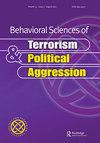态度上的Santri:印尼虔诚的穆斯林对恐怖主义的支持和对非穆斯林的消极态度
IF 1.3
Q2 POLITICAL SCIENCE
Behavioral Sciences of Terrorism and Political Aggression
Pub Date : 2021-06-22
DOI:10.1080/19434472.2021.1944272
引用次数: 5
摘要
学者们继续努力确定宗教信仰——尤其是更严格的宗教观点和实践——为恐怖主义的出现和发展提供肥沃土壤的程度和方式。使用来自印尼群岛各地的穆斯林受访者的大量样本,我们发现:(1)正统宗教信仰水平越高,对非穆斯林的态度越消极;(2)正统宗教宗教信仰水平高,对恐怖组织的支持越低。我们认为,这一发现与印尼圣德里人(即善于观察的穆斯林)的正统宗教信仰类型一致,其特征通常是集体宗教实践、与宗教群众组织的关系和宗教教育。在印度尼西亚的背景下,正统的宗教信仰可能提供了动员恐怖分子的工具,但不是动机,尽管它可能会助长外部团体的负面看法,但它实际上可能构成更广泛支持恐怖主义的障碍。本文章由计算机程序翻译,如有差异,请以英文原文为准。
Santri with attitude: support for terrorism and negative attitudes to non-Muslims among Indonesian observant Muslims
ABSTRACT Scholars continue to wrestle with determining the extent and ways in which religiosity – and particularly more strict religious views and practices – provides fertile ground for the emergence and growth of terrorism. Using large samples of Muslim respondents from across the Indonesian archipelago, we find that: (1) higher levels of orthodox religiosity are associated with more negative attitudes to non-Muslims, and (2) higher levels of orthodox religiosity are associated with lower support for terrorist groups. We propose that this finding is consistent with the type of orthodox religiosity of Indonesian santri – that is, observant Muslims – which is usually characterised by collective religious practices, affiliation with religious mass organisations and religious education. In the Indonesian context, orthodox religiosity might provide vehicles but not motives of terrorist mobilisation, and – although it can foster negative views of out-groups – it can actually constitute a barrier to broader support for terrorism.
求助全文
通过发布文献求助,成功后即可免费获取论文全文。
去求助
来源期刊

Behavioral Sciences of Terrorism and Political Aggression
POLITICAL SCIENCE-
CiteScore
4.80
自引率
10.00%
发文量
27
 求助内容:
求助内容: 应助结果提醒方式:
应助结果提醒方式:


